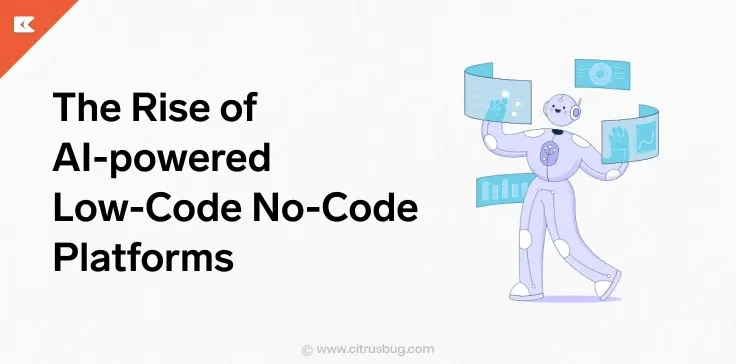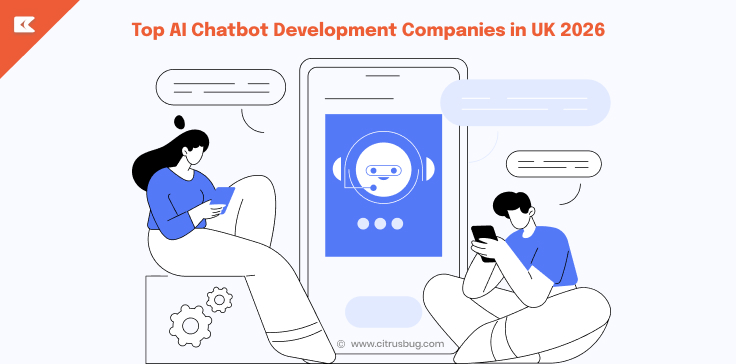The Rise of AI-powered Low-Code No-Code Platforms
- March 28, 2024
-
2844 Views
- by Ishan Vyas

Businesses face the relentless pressure to streamline their operations and innovate their solutions to meet the shifting consumer requirements. Traditional coding methods cannot help stay relevant and competitive as the development process is lengthy.
The tedious learning curve, time-consuming debugging and limited resource availability add to the challenges. Additionally, the development environment is complex, making it impossible for someone with limited understanding or expertise to develop applications.
Moreover, the businesses need to shell out a lot of money at every phase, including maintenance of the application. The low-code no-code platforms come to the rescue. These platforms can reduce the process timeline and ensure faster production.
AI-powered low-code no-code platforms can democratise your development processes, enabling efficient outcomes. If you want to create advanced apps, you can partner with trusted software outsourcing companies that reduce costs and accelerate development.
This article will explore in-depth the need for AI-based low-code or no-code platforms. You will also learn the advantages of adopting them in your development processes.
Traditional or manual coding involves learning programming languages, such as C, Java and Python. The developers used these languages to create the syntax and develop the code for the logic proposed.
While there were frameworks that supported the development, you needed developers with skills and proficiency in managing the platform. They needed to understand the algorithms, principles of development and data structures to create the code.
This time-consuming and labour-intensive job required a lot of man-hours and increased cost. If the project wasn’t validated from the start, it would only add to the costs and failure rate.
How Low-Code No-Code Development Helps Businesses
With the rising need for rapid software development, businesses started looking for alternatives. Low code no code development emerged as the best substitute for traditional methods. The global low-code no-code market revenue was valued at $22.5 billion in 2022.
These platforms comprised visual interfaces and in-built components that could help developers launch products faster. It helped the non-coders build MVPs and basic solutions without coding knowledge.
Using the drag-n-drop platforms businesses could work on their software solution and accelerate the timelines. The reusable components and templates allowed the developers to avoid building code from scratch. This also helped enhance the testing capabilities.
The dependence on expert professionals is also reduced with these platforms. They democratized software development services that allowed teams to build solutions without relying on external teams.
Moreover, you could create accessible and inclusive interfaces with these platforms. They helped lower the barriers to entry for successful solutions.
Integrating AI into Low Code No Code Platforms
AI tool integration in low-code no-code platforms has introduced better capabilities. You can use advancements such as natural language processing and image recognition to improve your coding. AI code generation further enhances these platforms by automatically producing functional code from simple inputs, reducing manual effort and accelerating development cycles.
Non-tech business owners can use their conversational language in the coding platform to generate the syntax. They can also use predictive analytics and intelligent automation to produce error-free code.
These platforms enable you to speed up app development. Automating the specific instances of code development (read repetitive tasks) can help your developers focus on innovation. This would assist them in enhancing productivity.
The software platforms can offer suggestions that can help improve the code. It can also work towards enhancing the quality of the product.
You can also use the data-backed insights to improve the performance and user experience of the product.
Advantages of Using AI-Powered Low-Code No-Code Platforms
AI-based low-code no-code platforms can help transform the software development landscape in multiple ways. Here you will learn a few benefits of adopting these platforms.
1. Accelerates Time-to-market
The Artificial intelligence-enabled platforms reduce the time needed to push out software into the market. Powered by intuitive interfaces, pre-built components and automated workflows, they can help you move from ideation to deployment faster.
You can use them for rapid prototyping. The drag-and-drop interface design allows you to incorporate the necessary functionality. Using AI can help you iterate the app to meet the evolving user needs.
2. Makes the Solution Accessible & Inclusive
The low-code no-code platforms reduce the barriers to entry, allowing everyone with an understanding of the product requirements to build a solution.
The AI-powered platforms enable more inclusivity and accessibility. They use NLP, keyboard navigation and other intuitive inputs that make the platforms usable by everyone.
The users can then use their understanding and expertise to create tailored solutions for the business. The collaborative environment fosters teamwork and allows the stakeholders to contribute equally in building the application.
This tool allows people with diverse backgrounds to come together and build an application.
3. Reduces Need for Skilled Experts
As AI-enabled platforms have democratised the whole development process, you don’t need skilled experts to work on the app development. There is no need for people knowledgeable in a specific programming language or syntax to help build the application.
The in-built libraries combined with the drag-n-drop visual design allow users to create apps without coding. They can move around the elements to create the interface and work around the logic.
The platform uses automation and in-built assistants to create the code and logic for the application. As a result, you can use your in-house team to build the application. This reduces the time and money spent on hiring a team.
4. Improves Maintenance and Scalability
Developers tend to face issues when they try to scale or maintain the application. This can only occur by eating into their infrastructure, resources or budget. Moreover, they need to ensure that the updates are seamless and don’t impact their existing product.
AI-driven low-code no-code platforms can enable seamless enhancements. AI continuously monitors the app’s performance to detect issues. This will help them advance the app and proactively improve the solution.
Moreover, these platforms can integrate with new environments that facilitate the scalability of the app. You can integrate them with third-party solutions to introduce new features and functionality.
5. Reduce Development Complexity
Software development is a complex landscape that requires diverse platforms, systems, tools and proficient developers. The complexity challenges evolve as you plan to scale or maintain the application.
AI-based low-code no-code platforms can help overcome the complexity challenges. They tackle complex tasks using intelligent assistance and predictive analytics. Moreover, they help deliver sophisticated code without consuming time or resources.
You don’t need resources or a detailed infrastructure, which makes scaling the app or maintaining it efficient.
6. Deliver Cost-effective Solutions
Imagine the costs you will likely incur when planning a detailed app development. You need the resources and the infrastructure for traditional development.
AI-based platforms reduce the need for elaborate systems or extra resources. They can help you plan product development without hiring a specialist or expert for the technical aspects.
Moreover, it enhances collaboration and automates various tasks. This helps in streamlining the entire operations and reducing resource utilization.
With AI-based platforms, you can lower costs while maximizing efficiency and outcomes.
7. Democratize Development
Software development has been associated with skilled programmers and IT professionals. However, with AI-based platforms, business owners, domain experts and even citizen developers can build a software solution.
Their powerful interface combined with pre-built components allows people with varying technical expertise to deliver the application. This allows the stakeholders to collaborate and develop innovative applications.
Using these platforms, businesses can ensure reliable and adaptable software solutions that offer long-term success.
Potential Drawbacks of AI-powered Low-Code No-Code Platforms
Let’s discuss the potential limitations of the platform that can prove to be a hindrance in development.
- You rely on AI-based features to deliver the code or solution. This over-reliance on AI reduces your control of coding the solution. additionally, it also limits the customization possibilities and can lead to biases in the outcomes.
- Users may face a slight learning curve while adopting new tools or methodologies. They may need to understand AI and get some training therein to use them efficiently.
- Embedding AI into your existing integration solution may be technically challenging. For instance, to implement an AI-powered data integration, you must first understand the algorithm selection and model training for the perfect integration. You may need to gain the right skills in this domain.
- If you are working in a large-scale or resource-constrained environment, you may experience performance bottlenecks. This can also pose a challenge for your developers or teams.
- You may face issues concerning vendor lock-in, which can also limit your customization abilities. Apart from this, you may face issues related to standardization, interoperability and alternatives with the AI-powered platform.
- You may store sensitive data that can raise privacy and security considerations. This can become an issue while working with AI-powered platforms. It is crucial to choose a platform that implements encryption protocols, access controls and security measures.
- If the low-code no-code platforms don’t adhere to compliance with regulations it can cause legal concerns. You must ensure they adhere to regulatory compliances such as GDPR, HIPAA and PCI DSS.
Conclusion
In this article, you explored the need for AI-based low-code no-code platforms to ensure rapid app development. Accelerated timelines, the need for low-cost solutions and increased development complexities have led to increased adoption of these platforms.
The AI-powered no-code low-code platforms guarantee accessible solutions, greater inclusivity, and minimal resource utilization. You must address the security and customization challenges for sustainable and successful applications.
These platforms can help innovate the apps and ensure advancements in the software development realm. To ensure limitless possibilities and leverage the brilliance of these platforms, you can partner with expert software development companies. They can guide your idea in the correct direction to attain success.





 SaaS Development
SaaS Development Web Application Development
Web Application Development Mobile Application Development
Mobile Application Development Custom Software Development
Custom Software Development Cloud Development
Cloud Development DevOps Development
DevOps Development MVP Development
MVP Development Digital Product Development
Digital Product Development Hire Chatbot Developers
Hire Chatbot Developers Hire Python Developers
Hire Python Developers Hire Django Developers
Hire Django Developers Hire ReactJS Developers
Hire ReactJS Developers Hire AngularJS Developers
Hire AngularJS Developers Hire VueJS Developers
Hire VueJS Developers Hire Full Stack Developers
Hire Full Stack Developers Hire Back End Developers
Hire Back End Developers Hire Front End Developers
Hire Front End Developers AI Healthcare Software Development & Consulting
AI Healthcare Software Development & Consulting Healthcare App Development
Healthcare App Development EHR Software Development
EHR Software Development Healthcare AI Chatbot Development
Healthcare AI Chatbot Development Telemedicine App Development Company
Telemedicine App Development Company Medical Billing Software Development
Medical Billing Software Development Fitness App Development
Fitness App Development RPM Software Development
RPM Software Development Medicine Delivery App Development
Medicine Delivery App Development Medical Device Software Development
Medical Device Software Development Patient Engagement Software Solutions
Patient Engagement Software Solutions Mental Health App Development
Mental Health App Development Healthcare IT Consulting
Healthcare IT Consulting Healthcare CRM Software Development
Healthcare CRM Software Development Healthcare IT Managed Services
Healthcare IT Managed Services Healthcare Software Testing services
Healthcare Software Testing services Medical Practice Management Software
Medical Practice Management Software Outsourcing Healthcare IT Services
Outsourcing Healthcare IT Services IoT Solutions for Healthcare
IoT Solutions for Healthcare Medical Image Analysis Software Development Services
Medical Image Analysis Software Development Services Lending Software Development Services
Lending Software Development Services Payment Gateway Software Development
Payment Gateway Software Development Accounting Software Development
Accounting Software Development AI-Driven Banking App Development
AI-Driven Banking App Development Insurance Software Development
Insurance Software Development Finance Software Development
Finance Software Development Loan Management Software Development
Loan Management Software Development Decentralized Finance Development Services
Decentralized Finance Development Services eWallet App Development
eWallet App Development Payment App Development
Payment App Development Money Transfer App Development
Money Transfer App Development Mortgage Software Development
Mortgage Software Development Insurance Fraud Detection Software Development
Insurance Fraud Detection Software Development Wealth Management Software Development
Wealth Management Software Development Cryptocurrency Exchange Platform Development
Cryptocurrency Exchange Platform Development Neobank App Development
Neobank App Development Stock Trading App Development
Stock Trading App Development AML software Development
AML software Development Web3 Wallet Development
Web3 Wallet Development Robo-Advisor App Development
Robo-Advisor App Development Supply Chain Management Software Development
Supply Chain Management Software Development Fleet Management Software Development
Fleet Management Software Development Warehouse Management Software Development
Warehouse Management Software Development LMS Development
LMS Development Education App Development
Education App Development Inventory Management Software Development
Inventory Management Software Development Property Management Software Development
Property Management Software Development Real Estate CRM Software Development
Real Estate CRM Software Development Real Estate Document Management Software
Real Estate Document Management Software Construction App Development
Construction App Development Construction ERP Software Development
Construction ERP Software Development






